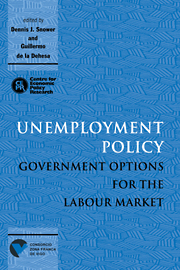Book contents
- Frontmatter
- Contents
- List of figures
- List of tables
- Preface
- Acknowledgements
- List of conference participants
- 1 Introduction
- PART ONE GENERAL POLICY ISSUES
- 2 Evaluating unemployment policies: what do the underlying theories tell us?
- 3 High unemployment from a political economy perspective
- Discussion
- Discussion
- PART TWO DEMAND MANAGEMENT AND SUPPLY-SIDE POLICY
- PART THREE SUBSIDISING EMPLOYMENT AND TRAINING
- PART FOUR LABOUR MARKET REGULATIONS
- PART FIVE POLICY, JOB REALLOCATION AND THE UNEMPLOYMENT–PRODUCTIVITY RELATION
- PART SIX COMPARING UNEMPLOYMENT POLICIES
- Index
3 - High unemployment from a political economy perspective
Published online by Cambridge University Press: 07 September 2010
- Frontmatter
- Contents
- List of figures
- List of tables
- Preface
- Acknowledgements
- List of conference participants
- 1 Introduction
- PART ONE GENERAL POLICY ISSUES
- 2 Evaluating unemployment policies: what do the underlying theories tell us?
- 3 High unemployment from a political economy perspective
- Discussion
- Discussion
- PART TWO DEMAND MANAGEMENT AND SUPPLY-SIDE POLICY
- PART THREE SUBSIDISING EMPLOYMENT AND TRAINING
- PART FOUR LABOUR MARKET REGULATIONS
- PART FIVE POLICY, JOB REALLOCATION AND THE UNEMPLOYMENT–PRODUCTIVITY RELATION
- PART SIX COMPARING UNEMPLOYMENT POLICIES
- Index
Summary
Introduction
Unemployment in Europe has now been abnormally high for almost 20 years. Yet this has generated no major disruption in the way society is organised or in the political system: it seems that many people have learned to live with it. An article in the Financial Times (17 May 1994) acknowledged that
given the intractability of the jobless problem, and the universal political commitment to resolving it, unemployment may have surprisingly little impact on voting patterns … In most large European countries the electorate has lived with persistently high unemployment for nearly two decades and any party offering a quick-fix solution would face a large credibility gap.
Yet we see countries which for years have avoided high unemployment: the USA, Switzerland, Sweden, Japan, Portugal. So maybe it is not the problem which is intractable but the political commitment to resolving it which is not as universal as it may seem.
In this chapter we study the problem of (European) unemployment from a political economy perspective. That is, we study how the policies that are conducive to high unemployment are the outcome of the political process and thus reflect the balance of power in society. We also analyse how policies aimed at curing unemployment must pass the test of political viability.
The chapter is organised as follows. Section 2 (‘Theory’) discusses some general principles that are useful in understanding the political aspects of labour market policy.
- Type
- Chapter
- Information
- Unemployment PolicyGovernment Options for the Labour Market, pp. 54 - 73Publisher: Cambridge University PressPrint publication year: 1997
- 2
- Cited by



